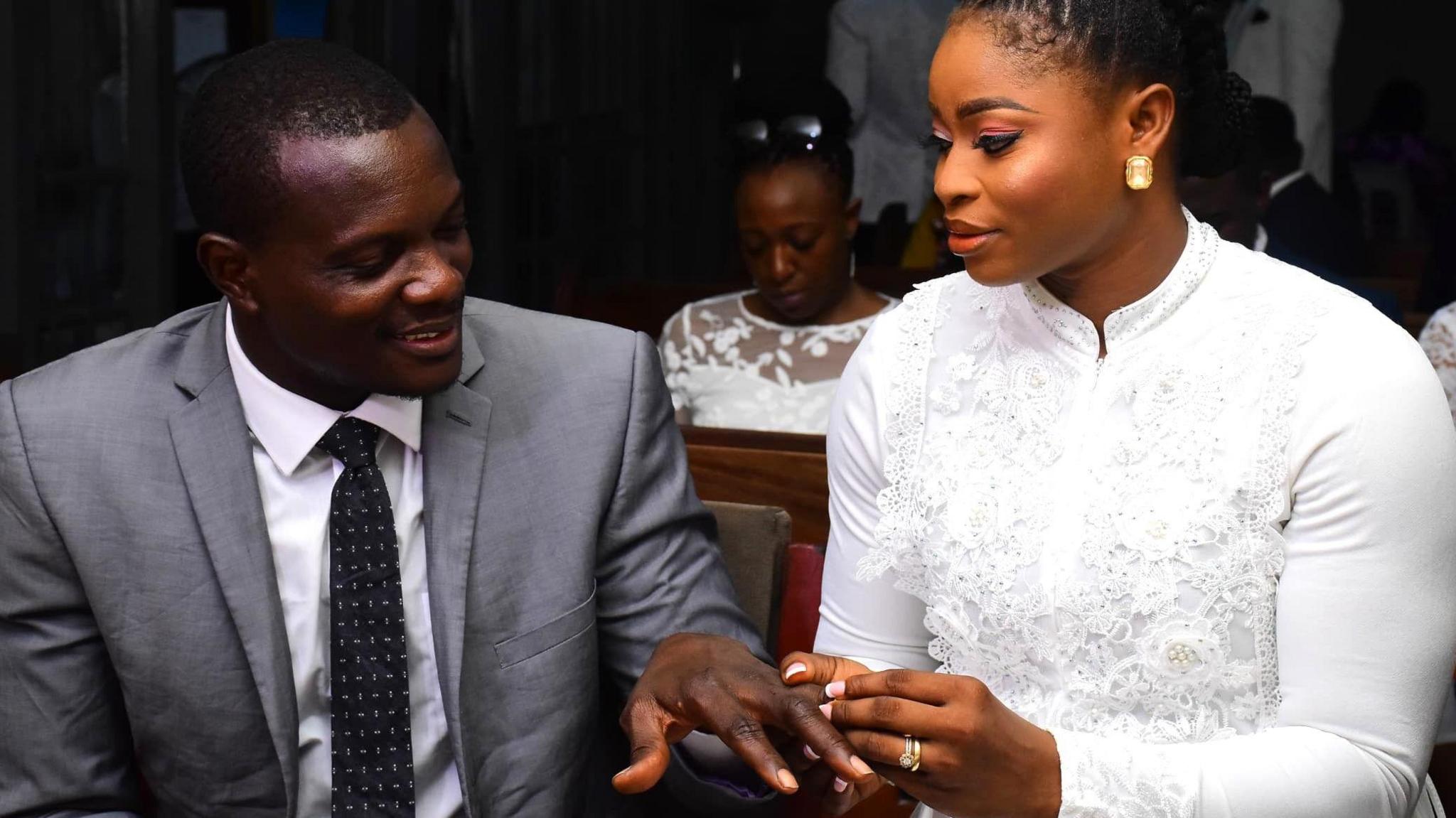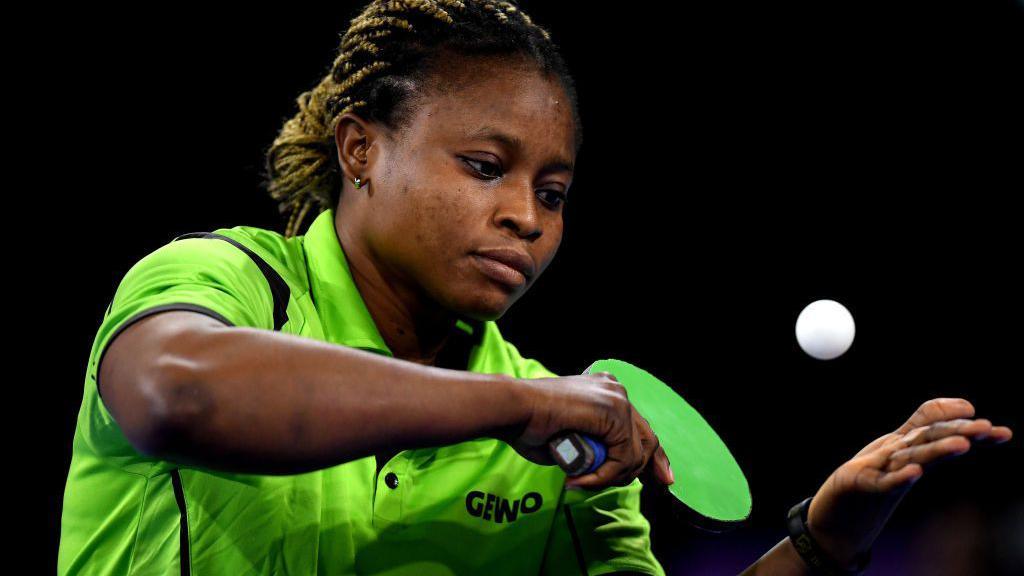The Paralympic table tennis love story
Christiana and Kayode Alabi go into the Paralympics as the top-ranked African players in their respective classes
- Published
Paris is renowned for its association with love and romance, having inspired countless novels, films and songs over the years.
Now, as the city prepares to host the Paralympic Games, an African love story is set to shine in the French capital with the promise of gold.
The protagonists poised to compete for medals are Christiana and Kayode Alabi, the power couple of Para-table tennis from Nigeria.
Both are the continent's top-ranked players in their class, with Christiana winning silver at the 2022 Commonwealth Games and her husband securing two gold medals at the African Para Championships last year.
Their journey together began in 2017, during national trials for the Commonwealth Games, and Kayode recalls their first meeting with fondness.
"It was her first time at the camp and she looked very beautiful and quiet," he told BBC Sport Africa.
Christiana, however, was not immediately won over.
"He came to me, we talked, but then I was not giving him much attention," she said.
All you need to know about the Paris Paralympics
- Published28 August 2024
Husnah Kukundakwe: I hope others will feel courage to join in
- Published21 August 2024
Despite the initial hesitation and distance between them - Christiana was based in Asaba, a seven-hour journey from Lagos where Kayode lived - the couple maintained their connection through phone calls.
In 2019, Christiana moved to Lagos to be with Kayode and further her career.
"Things were tough in Asaba and I was struggling to continue," Christiana, who is a wheelchair user, explained.
"Kayode encouraged me to join him so we could train together."
Their marriage in 2022 faced external criticism, with some questioning the viability of their relationship.
"While our families supported us, others saw it as unusual for two people with disabilities to be together," Christiana recalled.
Against these odds, their relationship has flourished both professionally and personally.
"Christiana has been my coach at many tournaments," Kayode said.
"We listen to each other and work well together, which is why we're heading to the Paralympics as a team.”
Kayode will play in the men's class 6 singles as well as men's and mixed doubles events, while Christiana will compete in the women's class 5 singles.
"We practise together five times a week," Christiana said.
"He's passed on his knowledge of the game to me, and we've grown both as athletes and partners."
Bonded by fate, thriving by purpose

The couple have a tennis table in their living room, which they use for practice when they cannot attend training sessions
The Alabis' tale is particularly compelling because of the barriers they face in Nigeria.
Both were affected by polio as children, which is why Christiana uses a wheelchair, while Kayode lost the use of his right leg and requires support to walk.
"I was the only child with a disability in my community, which made life very difficult," Christiana revealed.
"My disability made it hard to make friends and I was very shy, rarely mingling with others."
Although Kayode had a similar experience, he did find support in his friends.
"Some friends would take turns to carry me on their back," he said.
"It was tough to keep up with transport to school or training. I was always the last person to get on the bus because I waited for the crowd to thin out first."
As adults, the couple still find their daily lives marked by significant obstacles.
"Navigating from our home to the training ground is extremely challenging," said Kayode.
"Finding a bus that can accommodate my wife's wheelchair is not easy."
According to the Nigerian National Development Plan 2021-2025, more than 96% of people with disabilities in the country lack access to assistive devices.
When it comes to public infrastructure - which includes things like buildings, transportation and roads - 98.5% remains inaccessible.
Despite these hurdles, Christiana finds solace in their mutual support.
"We help each other out.
"Kayode is very caring. If I need something and don't want to go out, he'll take care of it for me. Financially, we manage well."
A couple on a medal quest

Christiana won a silver medal at the 2022 Commonwealth Games in Birmingham competing as Ifechukwude Ikpeoyi
The couple have ramped up their training regime in their determination to excel at the Paralympics.
Their rigorous preparation incorporated weekly gym sessions to build strength and endurance.
Beyond that, the Alabis dedicate time at home to video analysis of their practice sessions.
They have driven each other on, with Christiana the first to seal her spot at the Games via the African qualifying event in Egypt last September.
"It was my wife who qualified while I was still in the semi-final," Kayode recalled.
"That motivated me to put in even more effort so that we both could qualify."
Christiana, reflecting on their joint achievement, expresses her gratitude and ambition.
"I'm glad that we made it together," she said.
"My expectation is to get to the top, bring honour to Nigeria, my family and my husband, who has been training me all along."
Their daily routine is a testament to their dedication.
Each morning begins with a two-hour training session. After a midday break, they return for an additional session in the evening.
This disciplined schedule reflects their commitment to not only supporting each other but also to achieving their shared goal of success.
As the Alabis finalise their preparations for Paris 2024, this Paralympic love story is set to inspire those watching in Nigeria and around the world.